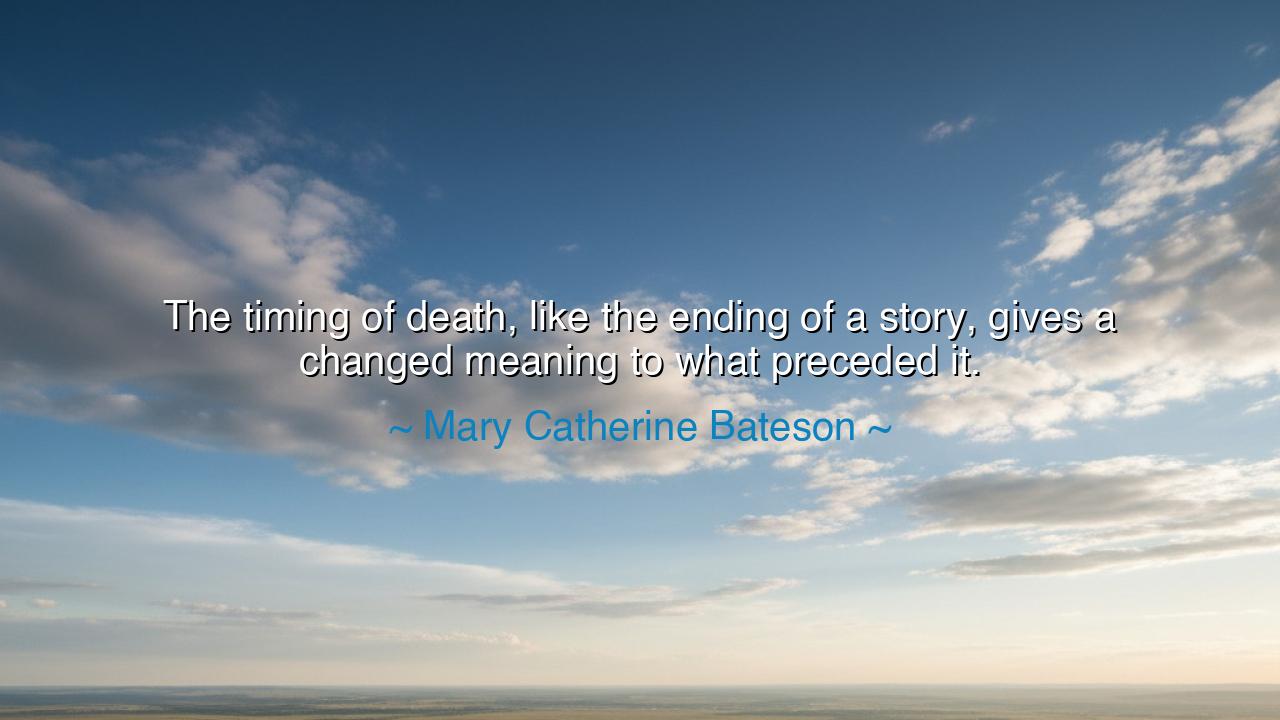
The timing of death, like the ending of a story, gives a changed
The timing of death, like the ending of a story, gives a changed meaning to what preceded it.






“The timing of death, like the ending of a story, gives a changed meaning to what preceded it.” Thus wrote Mary Catherine Bateson, the anthropologist and philosopher of life’s unfolding patterns. In these words lies a truth that all who live must one day face: that death is not merely an end, but the final punctuation that defines the meaning of the whole. Just as the closing of a book reshapes our understanding of all that came before, so too does the moment of death illuminate or alter the story of a life. What was once ordinary becomes symbolic; what seemed incomplete may be made whole; what appeared random gathers into a mysterious order.
Bateson, the daughter of Margaret Mead and Gregory Bateson—giants of human inquiry—was herself a student of patterns, of the ways in which people shape meaning through their lives. Her insight into death is not born of despair, but of reverence for life as narrative. She saw every human existence as a story being written moment by moment, each choice and event forming part of an intricate design. Yet, like all stories, its full meaning cannot be known until the end. The timing of death—whether sudden or gradual, early or late—becomes the frame through which the entire picture is viewed. It is only then that the pattern reveals itself, and the fragments of living find coherence in their conclusion.
The ancients understood this deeply. The Greeks believed that no man could be called happy until his life was finished, for the end determines the worth of the tale. The philosopher Solon, when asked whether a man could be called fortunate while still living, replied, “Call no man happy until he is dead.” To modern ears, this may sound morbid, but Solon’s wisdom mirrors Bateson’s truth: that the final moment casts its shadow backward across all the years, transforming the meaning of joy and sorrow alike. A life that ends in peace may redeem years of struggle; a life cut short may make even small acts seem radiant with promise unfulfilled. Death, like the ending of a story, gives perspective to the plot.
Consider the life and death of Abraham Lincoln, whose tragic assassination transformed his legacy into myth. While he lived, he was a man beset by doubt, accused by critics, and tested by civil war. But the timing of his death—at the very dawn of victory, after speaking words of reconciliation and mercy—gave his story a sacred resonance. The meaning of his life was transfigured by its end; the weary leader became a martyr for unity, the man became symbol. Had he lived long into peace, his legacy might have been different, perhaps more human but less divine. The ending defines the memory, and so death became the final editor of his life’s story.
Yet Bateson’s insight is not reserved for the great or powerful—it speaks to every mortal heart. The timing of death—whether in youth or old age, in triumph or quietness—changes how we and others understand our lives. The parent who dies after reconciling with a lost child gives a different meaning to their past than one who leaves before such peace. The artist who perishes before recognition casts their work in the light of tragedy, while the one who dies after success gives their labor a sense of fulfillment. Death reframes life, not by altering its facts, but by altering its interpretation. It is the final lens through which all that has been comes into focus.
And yet, there is a gentleness in this truth. To know that death gives meaning to life is not to fear it, but to live with intention. If we cannot control the timing of our end, we can still shape the story that leads to it. Every act of kindness, every word of love, every moment of courage becomes part of the narrative that death will one day reveal in full. To live well, then, is to write a story that can bear its final sentence with grace. We do not choose our ending, but we can choose the integrity of the tale.
The lesson, my listener, is both humbling and profound: live with the awareness that the end will one day interpret the beginning. Let your choices be guided not by fear of death, but by the desire to leave behind a story worth retelling. Reconcile quickly, love deeply, labor faithfully—so that when your final chapter comes, it gives dignity and meaning to all that has preceded it. Remember always that a good death is not one free from pain or loss, but one that completes the pattern of a good life.
So, take to heart the words of Mary Catherine Bateson: “The timing of death, like the ending of a story, gives a changed meaning to what preceded it.” For life is not judged by its length, but by the beauty of its arc. Each day is a sentence, each year a paragraph, and the ending—however it comes—will reveal the author you have been. Live, then, as if you are writing something sacred. Let your story be one of love, of courage, of truth, so that when the final page turns, it may do so with meaning that shines beyond the end.






AAdministratorAdministrator
Welcome, honored guests. Please leave a comment, we will respond soon